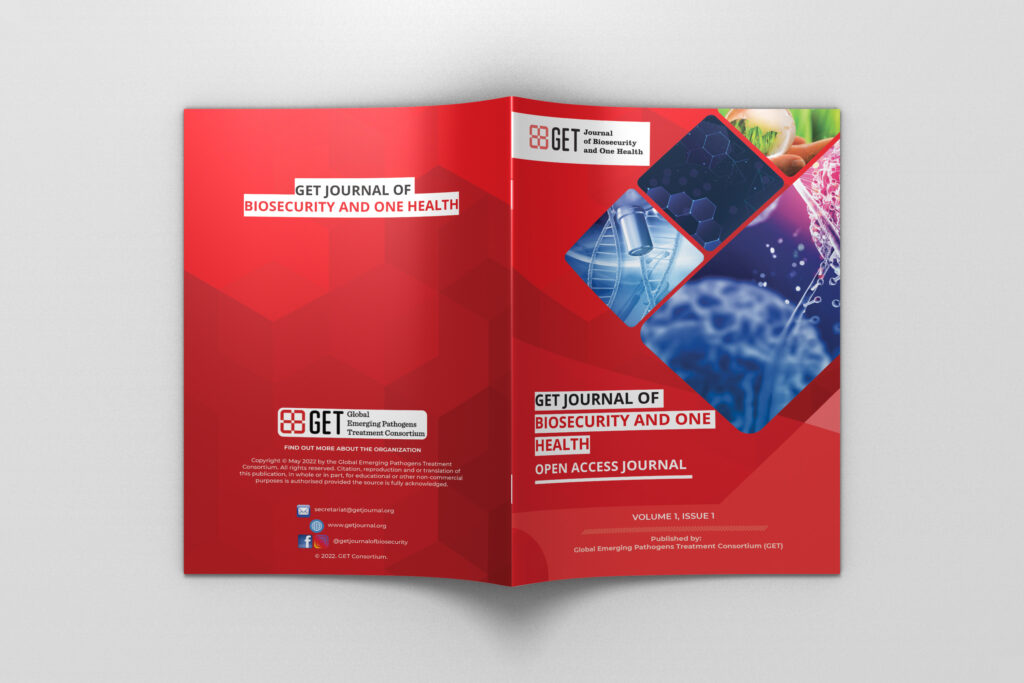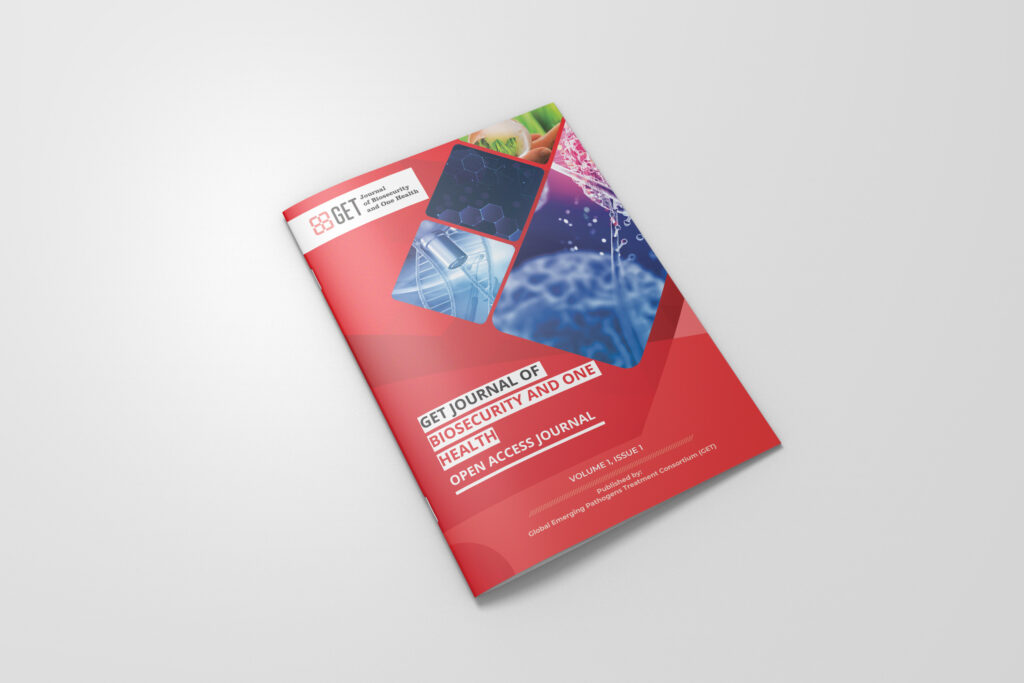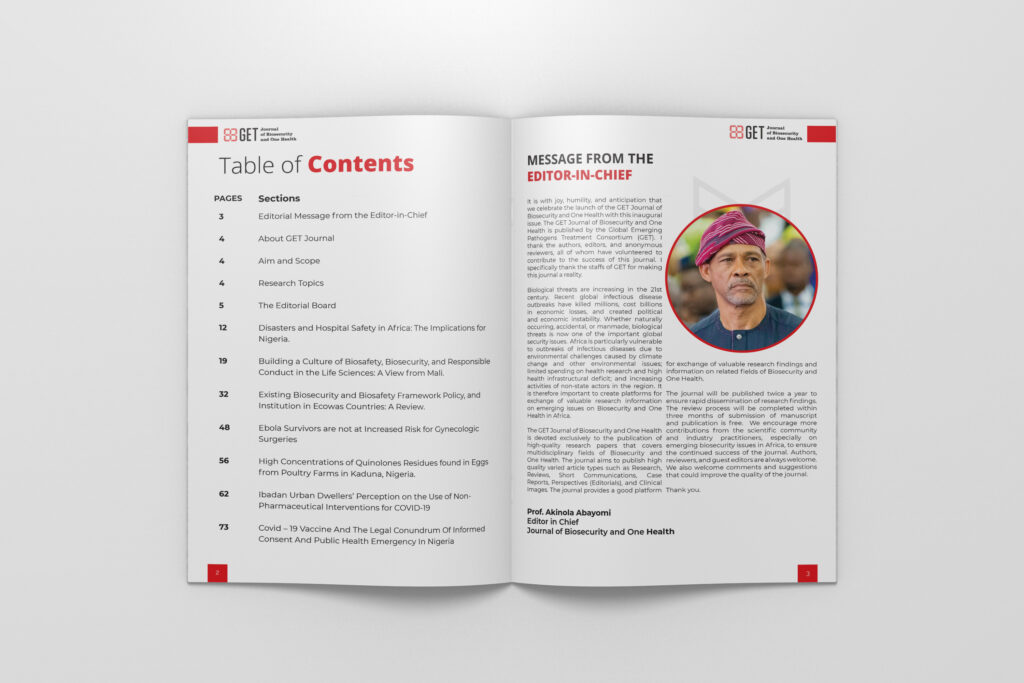GET Journal of Biosecurity and One Health
Volume 2 Issue 1
Published by:
Global Emerging Pathogens Treatment Consortium (GET)
Authors: Tangwa GB, PhD, FCAS, FAAS
Cameroon Bioethics Initiative (CAMBIN)/University of Yaounde 1, Cameroon
ORCID ID: 0000–0003–0062–8106
GET Journal of Biosecurity and One Health, Volume 2, Issue 1, May 2023, Pages 1-6.
Article Keywords: Africa; Epidemics; Colonialism; Exploitation.
Within the four decades spanning the 1980s to the year 2020 and counting, the continent of Africa has witnessed many deadly epidemics, notable among which are HIV/AIDS, Ebola, and COVID–19. For anyone in Africa who has lived through these epidemics and critically observed their impacts on the continent, it is evidently clear that the lessons that should be learned from them have not yet been fully learned. These unlearned lessons are related without being
limited to the political, economic, healthcare, and ethical domains.
The events accompanying COVID–19, globally and on the African continent, have underscored these lessons that must be learned, or else the continent has no future except as an entity of colonial and global exploitation. In this article, I propose to highlight and briefly
discuss some of these lessons that should be learned, failing which we, Africans, need to be studied as a strange species of human beings, completely devoid of rational self–interest, inhabiting the most endowed continent on planet Earth, without being aware of it.
Authors: Sokunbi TO1*; Omojuyigbe JO1; and Mowobi OD1 1Faculty of Pharmacy, Obafemi Awolowo University, Ile–Ife, Nigeria.
Corresponding Author: Sokunbi TO.
ORCID ID: 0000–0002–0391–3636
GET Journal of Biosecurity and One Health, Volume 2, Issue 1, May 2023, Pages 7-19
Article Keywords: COVID–19; Monkeypox; Africa; Healthcare System.
The continuous rise in the number of monkeypox cases amidst the ongoing COVID–19 pandemic in Africa calls for concern, especially regarding its possible impact on the healthcare system. The current state of the healthcare system contributes substantially to the limitation of
COVID–19 elimination in the region, which shows the poor state of the system. The re–emergence of the monkeypox virus amidst the pandemic means that the system must be strengthened to provide quality healthcare delivery for Africans. Therefore, it is high time that African health policymakers and governments begin to make decisions, decisions that will determine the fate of the African healthcare system and, consequently, the lives of people living in Africa in the ongoing event of COVID–19 and monkeypox.
Authors: Subair MO1*
1 Faculty of Law, Lagos State University
ORCID ID: 0000–0003–4440–8326
GET Journal of Biosecurity and One Health, Volume 2, Issue 1, May 2023, Pages 20-33
Article Keywords: COVID–19; Vaccine; Right; Prison inmates; Nigeria.
Citizens are members of a particular country who, because of birth, registration, or application, are entitled to enjoy certain basic rights and privileges. Discrimination by reason of age, ethnicity, religious background, or liberty of any person should not be entertained at any level; hence, every citizen is to be treated equally in terms of the enjoyment of basic rights and privileges. The most important fundamental right to be enjoyed by a citizen is the right to life, mainly because a person needs to be alive to enjoy other rights and privileges as contained in the constitution. However, the right to life is not limited to the right not to take a person’s life, and rather it expands to the right to enjoy unhindered access to resources that will ensure good physical and mental well–being. Unfortunately, some countries are unable to ensure the enjoyment of these rights by all their citizens. In a bid to manage the limited resources, some persons are being discriminated against, one of which is inmates who are incarcerated and serving an imprisonment term. This act of discrimination was evidenced in 2020 during the COVID–19 pandemic when immediate preventive measures were taken across the country to curb the spread of the virus. It became a cause of concern whether inmates in correctional centres were equally carried along on these measures. This article will discuss the right to life of prisoners in Nigerian correctional centres as it relates to their unhindered right to
health. Using the doctrinal and empirical method, this paper will identify the local and international instruments that provide for the enjoyment of the right to health of inmates, and particularly whether inmates were discriminated against in the exercise of the various preventive measures taken during the pandemic.
Authors: Onwude J1, Nwosu O1*, Ebegba R1
National Biosafety Management Agency, Nigeria.
Corresponding Author: Onyeka Nwosu
Phone No: +234–806–5002–754
ORCID ID: 0000–0003–1197–6810
GET Journal of Biosecurity and One Health, Volume 2, Issue 1, May 2023, Pages 34-40
Article Keywords: Biosecurity; Biothreats; Nigeria; Policy.
Nigeria has experienced its own share of biosecurity challenges, as evident in its exposure to some disease epidemics and pandemics. Significant outbreaks of diseases may cause devastation to humans and animals, as well as have severe economic, environmental and social impacts. Considering the multi–sectoral nature of biosecurity and the need to explore a coordinated approach to biosecurity, the National Biosecurity Policy and Action Plan 2022–2026 was developed with the aim of fostering the integration and harmonization of biosecurity strategies that will be implemented through the One–health approach for the prevention, early detection, rapid response to biothreats and recovery from biosecurity incidents. The policy document highlights Nigeria’s biosecurity priorities, Institutional Governance and Stakeholders’ Commitment, strategies and action plans, as well as a monitoring and evaluation framework to ensure a strong national biosecurity system. Ensuring biosecurity is a critical sector of a nation’s sovereignty towards ensuring the safety of lives of its citizens and the environment and improving the socio economic development of the country.
Authors: Ogah JO1*; Mba OO2; Okelola CA3 and Kolawole RM3
1Department of Microbiology, Faculty of Science, University of Lagos, Akoka,
Nigeria
2Department of Public Health, Faculty of Health Sciences, National
Open University of Nigeria, Lagos
3Department of Cell Biology and Genetics, University of Lagos, Akoka,
Nigeria
ORCID ID: 0009–0008–1462–2456
GET Journal of Biosecurity and One Health, Volume 2, Issue 1, May 2023, Pages 41-46.
Article Keywords: Bioaerosols; Meteorological Parameters; Microorganisms;
Public Health; Bariga; COVID–19.
The increasing human populations and their daily activities have contributed
to bioaerosols generation in Bariga, leading to air pollution with consequent
public health threats to exposed individuals. This study aimed to assess
public health risks associated with bioaerosols generated from outdoor
activities in Bariga community, Shomolu Local Government Area of Lagos
State. An analytical observational study design based on the measurement
of meteorological parameters in the field and laboratory analysis of
bioaerosol particles collected from the study population using a handheld
Kestrel 3000 weather meter and standard microbiological procedures,
respectively, was adopted. Four hundred (400) samples of bioaerosol
particles obtained by the Taro Yamani formula at a 5% level of precision
were analyzed. Passive air monitoring using Koch’s sedimentation method
was employed for total viable counts, while microbial isolates were identified
using cultural, morphological, and biochemical characterization. The
variation in environmental parameters obtained was largely dependent on
time and seasons, with a consequent adverse effect on the presence and
movement of bioaerosol particles in the atmosphere. Microbial populations
varied in densely and less-densely populated study areas. The study
identified Bariga as a high-risk area with CFU above 102 –104 CFU/m3, thus
capable of causing bioaerosols-related diseases. A total of twelve (12)
bacterial and six (6) fungal genera were isolated, with Gram-positive
bacteria having a prevalence rate of 87.02% and Gram-negative bacteria at
12.99%. The predominant fungi, on the other hand, were 87.94% mold and
12.06% yeast. One-way analysis of variance (ANOVA) at 0.05 significance
level showed a significant correlation (F-ratio ˃ F-critical value) (p=0.05)
between exposure to bioaerosol particles and associated health risks in the
exposed individuals. We recommend that Lagos State Government should
intensify efforts to reduce the public health effect of bioaerosols through
policies, structural planning, development, and education on
environmentally friendly activities and personal hygiene.
Author : Global Emerging Pathogens Treatment Consortium
GET Journal of Biosecurity and One Health (2023) 2(1), 23-37.
DOI: 1036108/GJOBOH/3202.20.0160
Authors: Ogunde AA1*; Chukwu AU2; Oseghale OI3 and Nwanyibuife OB4
1,2 Department of Statistics, University of Ibadan, Ibadan, Oyo State, Nigeria.
3Department of Mathematics and Statistics, Joseph Babalola University,
Arakeji, Osun State, Nigeria.
4Department of Statistics, the Federal University of Technology Owerri, Imo
State, Nigeria.
ORCID ID: 0000–0001–8708–8612
GET Journal of Biosecurity and One Health, Volume 2, Issue 1, May 2023, Pages 47-56.
Article Keywords: COVID–19; Characteristics Function; Mean Residual Function;
Case Fatality; Gamma Inverse Exponential Distribution.
In this study, we developed a novel distribution called Gamma Inverse
Exponential (GIE) distribution, which has proved to be a more flexible
distribution in modeling COVID-19 case fatality in Nigeria. We studied some
statistical properties of the new distribution, which include: moments,
incomplete moments, quantile function, Renyi entropy, and mean deviation.
A real-life data application to a number of reported cases of COVID-19
infection between March 2019 to 2021 shows that the GIE distribution has a
better fit than some competing distributions in fitting the data. Time series
analysis of the COVID-19 data is also considered.
Author : Global Emerging Pathogens Treatment Consortium
PREAMBLE The 8th African Conference on One Health and Biosecurity with the theme Strengthening Health Security and Mitigating Biological Threats in Africa was held Wednesday, 2nd November- Friday 4th November, 2022. The 8th edition of the annual conference was organized by the Global Emerging Pathogens Treatment Consortium (GET Africa) with the support of Lagos State Ministry of Health, and in partnership with major non-state institutions across the World. The conference focused on ways of improving health
security in the African Continent and addressing emerging biological threats. The 3-day conference
present a unique forum to raise National, Regional and Continental awareness and engage in deep introspection and robust interactions on existing health security measures and how to strengthen them, as the first urgent step toward mitigation of emerging biological threats in Africa. The conference,
attended by professionals and stakeholders across the various strata of the health and allied sectors of the society, received presentations from resource persons in the healthcare sector and related fields. The
following observations and recommendations emerged from exhaustive deliberations:



Volume 1 Issue 2 Journals
- Attitude Towards Covid-19 Vaccines and Willingness to be Vaccinated Among Orientation Camp Dwellers in IkareAkoko, Ondo State, Nigeria
- Design and Implementation of Nasopharyngeal Specimen Storage in Straws during the COVID19 Pandemic in Côte d’Ivoire
- Integration of Quality Management Systems in a Rural, Low-Resource Environment: The Experience at Phebe Hospital in Bong County, Liberia
- Molecular Detection of Measles Virus from Febrile Rash Illness Cases in Lagos State, Nigeria.
- Prevalence of Health Workforce Burnout during COVID-19 Response in Ethiopia.
